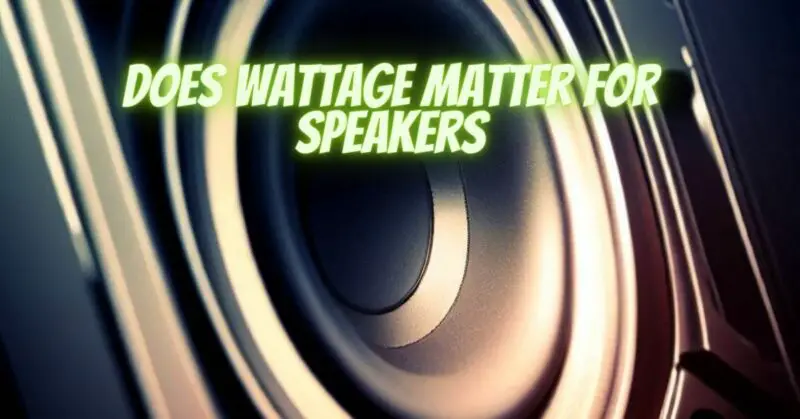When it comes to buying speakers, one of the specifications that often stands out is wattage. The wattage rating of speakers is frequently used as a measure of their power handling capability. However, understanding whether wattage really matters for speakers requires delving deeper into the concept of power ratings and their significance in real-world scenarios. In this article, we will explore what wattage means for speakers and its importance in determining speaker performance.
Understanding Speaker Wattage Ratings
Speaker wattage refers to the maximum power that a speaker can handle without getting damaged or experiencing distortion. It is typically measured in watts and is represented as “W” or “Watts” in speaker specifications. Two essential wattage ratings you’ll encounter in speaker specifications are “RMS” (Root Mean Square) and “Peak” power.
- RMS Power: RMS power is the continuous power that a speaker can handle on a long-term basis without overheating or causing damage. It represents the average power output that a speaker can handle during normal usage.
- Peak Power: Peak power, on the other hand, represents the maximum power level that a speaker can handle in short bursts or peak moments. It is usually higher than the RMS power and is more related to handling sudden spikes in sound, such as in action movie scenes or musical crescendos.
Importance of Wattage in Speaker Performance
While wattage ratings are an essential aspect of speaker specifications, they are not the only factor determining the performance of a speaker. Several other factors play a crucial role in the overall sound quality and loudness that a speaker can produce:
- Speaker Sensitivity: Speaker sensitivity measures how efficiently a speaker converts electrical power into sound output. It is usually expressed in decibels (dB) and indicates how loud a speaker will be at a specific distance with a given amount of power. Higher sensitivity speakers require less power to produce the same volume level compared to lower sensitivity speakers.
- Amplifier Compatibility: The wattage rating of your amplifier should match or be higher than the wattage rating of your speakers. If the amplifier’s power output exceeds the speaker’s power handling capacity, it can cause damage to the speakers. Conversely, an underpowered amplifier may not deliver the speaker’s full potential.
- Speaker Design and Components: The design of the speaker, including the driver materials, crossover networks, and enclosure construction, significantly influences its overall performance. High-quality components and engineering can result in better sound quality and efficiency, even at lower wattages.
- Listening Environment: The size of the room and the listening distance from the speakers can impact the perceived loudness. Larger rooms or greater distances may require speakers with higher power handling capability to achieve the desired volume levels without distortion.
While wattage ratings are essential indicators of a speaker’s power handling capability, they are just one piece of the puzzle in determining a speaker’s overall performance. Other factors such as sensitivity, amplifier compatibility, speaker design, and the listening environment also play vital roles. It is crucial to consider all these aspects holistically when selecting speakers to ensure they match your specific needs and preferences.
Choosing speakers with an appropriate wattage rating that complements your amplifier’s capabilities and is suitable for your listening environment will lead to an enjoyable and satisfying listening experience. Remember that higher wattage doesn’t always mean better performance; it’s about finding the right balance between power handling, efficiency, and sound quality to achieve the best results for your audio setup.


